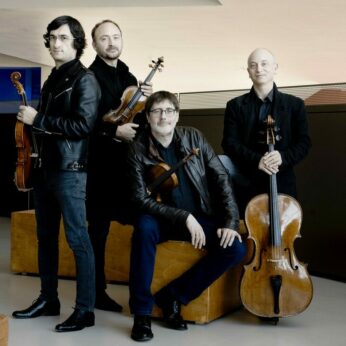Composer: Mieczyslaw Weinberg (b. 1919 - d. 1996)
Performance date: 30/06/2022
Venue: St. Brendan’s Church
Composition Year: 1963
Duration: 00:25:54
Recording Engineer: Simon Cullen, Ergodos
Instrumentation: 2vn, va, vc
Instrumentation Category:String Quartet
Artists:
Quatuor Danel (Marc Danel, Gilles Millet [violins], Vlad Bogdanas [viola], Yovan Markovitch [cello] -
[quartet]

Mieczysław Weinberg [1919-1996]
String Quartet No.9 in F sharp minor Op.80 [1963]
1. Allegro – attacca
2. Allegretto – attacca
3. Andante – attacca
4. Allegro moderato
The 1960s were Weinberg’s starry years, a time of immense productivity and achievement. These were the years of his most ambitious symphonies, Nos 5-10. These works included his three choral symphonies, Nos 6, 8, 9 that tackle the issue of war head-on. In addition he wrote perhaps the only opera to tackle the Holocaust, The Passenger. One of his greatest regrets was never to hear a live performance of what he considered to be his greatest achievement. In this period he also wrote his Requiem, a series of cantatas and song-cycles plus a wide selection of chamber music including four Quartets. Not a single work was a Socialist Realist commission for the Union of Composers, he financed his serious music with 25 film scores including the famous The Cranes are Flying. The even bigger pay-off for him was that all the finest Soviet performers played his works.
This was also the time of his celebrated string quartet rivalry with Shostakovich. After Weinberg completed his Ninth, Shostakovich had to write two in quick succession in order to overtake, something the two composers celebrated with a heavy drinking session. The boisterous opening to Weinberg’s Ninth certainly has the atmosphere of a well-fuelled party that gets rowdier and rowdier until it comes to a brutally sudden end. However you interpret its inexorable drive it certainly delivers a blast of energy. The Allegretto is signalled by Weinberg’s favourite pizzicatos, both delicate and thumping, before a graceful arco theme tries to emerge. It is mostly light-hearted and witty as well – with delicate harmonics to conclude.
The Andante is a free form Passacaglia with episodes of varying length imposed on the flow. It is both elegiac and extremely beautiful enabling us to appreciate the fantastic quality of the Danel Quartet. In the episodes the music rises to moments of extreme intensity before sinking back. Weinberg’s Finales, almost without exception, take strange and unusual paths full of surprises. This Allegro moderato opens with quizzical repeated phrases as though trying to decide what way to go. Out of nowhere comes a cheerful folk-dance idea occasionally interrupted by the stubborn repeated notes and a host of other surprising ideas that gradually coalesce into a delighted dancing coda concluding with a deeply satisfying major key pizzicato chord.
Francis Humphrys
Copyright © 2025 West Cork Music. All rights reserved.
Designed and developed by Matrix Internet